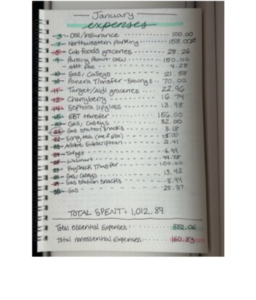Article by: Lillian Kraft
Out of all the stressors a college student may have in their day-to-day, the most prominent ones are arguably finances and budgeting. Loans and tuition payments take up not only a great deal of space in students’ bank accounts but also place a great amount of stress in their daily lives. A budget can help students understand how much money they have, what they should be spending it on and what they are actually spending it on.
These next three budgeting tips are helpful bits of advice I wish I had known sooner as a college student:
1) Keep a physical or digital budgeting sheet to record expenses
A paper copy of your expenses can help you physically see how much money you’re actually spending in a given month. This way, you can notice patterns in spending habits and make adjustments in your spending as needed.
John Donaldson, a professor at Northwestern, shares, “Budgeting is the scorecard of financial success. Without setting–and sticking to–a budget, it is almost impossible to achieve your financial goals.”
2) Find alternatives
Finding cheaper swaps for regular purchases is a helpful way to save money in the long run. Brooke Greenberg, a current Junior at Northwestern, says that while “it can be really easy to overspend while in college,” a way that she works on controlling her finances is by limiting herself to eating out twice a month and thrifting her clothes instead of buying firsthand.
One swap I’ve personally made that has saved a significant amount of money has been making my own coffee at home instead of exclusively buying coffee whenever I go out.
3) Leave room in your budget for fun
Finally, an important tip that has helped me in my own budgeting methods is to carve out a space in your paycheck for things I enjoy: coffee, pastries from a bakery, or little pick-me-ups for long days are all perfect examples of what I reserve these funds for. I find it so much easier to stick to a budget when I know I’m not missing out on opportunities to connect with friends and family over a coffeeshop conversation or a post-errand-run treat.
By tailoring your goals to fit your lifestyle, you’re more likely to stick to your budget and end up saving money in the long run!




